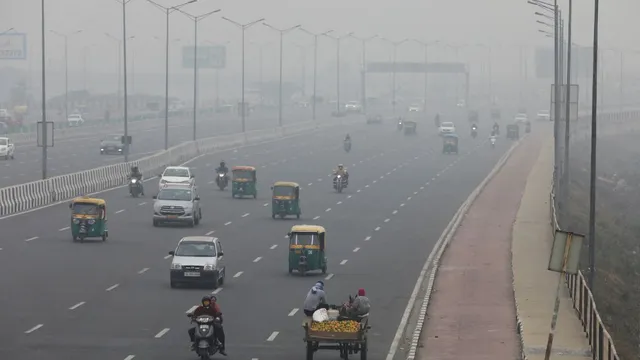- By Prerna Targhotra
- Mon, 18 Nov 2024 04:54 PM (IST)
- Source:JND
Effects Of Poor AQI On Health: The Air Quality Index (AQI) in Delhi has reached hazardous levels, with some areas recording peaks over 1000. Such severe pollution poses immediate and long-term health risks. One important metric for determining the amount of pollution in the atmosphere is the Air Quality Index (AQI). Human health can suffer greatly from a declining AQI, especially for susceptible populations including children, the elderly and people with underlying respiratory disorders. Protecting yourself and your loved ones from the negative impacts of polluted air requires knowing how poor air quality affects health and adopting the appropriate safeguards.
In a conversation with Jagran English, Dr Nityanand Tripathi, Senior Director and HOD - Cardiology & Electrophysiology, Fortis Hospital Shalimar Bagh explained how worsening AQI in Delhi-NCR can impact human health and ways to protect oneself.
Health Hazards Of Severe AQI
- Respiratory Issues: Polluted air irritates the lungs, causing coughing, wheezing, and shortness of breath. It can worsen conditions like asthma and chronic obstructive pulmonary disease (COPD).
- Heart Health: Exposure to air pollution increases the risk of heart disease and heart attacks by triggering inflammation and stress on the cardiovascular system. People with existing heart conditions are especially vulnerable.
- Vulnerable Groups: Children, pregnant women, and the elderly are more prone to adverse effects, including respiratory infections and reduced lung function.
How To Protect Yourself From Poor AQI And Air Pollution
Stay Indoors: Avoid outdoor activities, especially during peak pollution hours, and keep windows closed.
Improve Ventilation: Opt for HEPA filters in HVAC systems to ensure proper ventilation while minimising outdoor pollutants.

Ways To Protect Yourself From Air Pollution (Image Credits: Canva)
Wear Masks: Use N95 or higher-grade masks when stepping outside.
Monitor Air Quality: Check AQI levels using reliable apps and avoid outdoor exposure when levels are very high.
Limit Physical Exertion Outdoors: Avoid strenuous activities outside, as it increases inhalation of pollutants.
Hydration and Nutrition: Drink plenty of water and eat antioxidant-rich foods like fruits and vegetables to boost your body’s defence.
Support Your Heart: People with heart conditions should adhere to medications, avoid stress, and stay in controlled environments to reduce risks.
Plants for Cleaner Air: Add indoor plants like snake plants or peace lilies to improve air quality at home.
Use Public Transport: To lower your carbon footprint, you can reduce your emissions using public transportation or carpooling.
These measures are vital to safeguarding your health during this period of extreme air pollution. Tackling this crisis requires collective action, including reducing emissions and supporting green initiatives.
ALSO READ: Delhi Air At Severe Plus: 5 Potential Diseases Caused Due To Worst Air Quality
ALSO READ: Delhi Air Pollution: NCR ‘Inhales’ Equivalent Of 50 Cigarettes Daily As AQI Soars To 978

